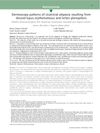Lichen Planopilaris: A Rare Inflammatory Cicatricial Alopecia
April 2012
in “
Informa Healthcare eBooks
”
Lichen planopilaris cicatricial alopecia lymphocyte-mediated inflammatory reaction hair follicles frontal fibrosing alopecia Graham-Little Syndrome violaceous papules perifollicular erythema follicular keratotic spines pruritus dermoscopy perifollicular scales blue-grey dots corticosteroids tetracyclines hydroxychloroquine pioglitazone hydrochloride vacuolar interface dermatitis CD3+ T-lymphocyte infiltrate direct immunofluorescent microscopy elastic-Van Gieson staining elastic fiber loss LPP scarring alopecia hair loss frontal hairline recession itching skin scales blue-grey spots steroids antibiotics Plaquenil Actos skin biopsy immunofluorescence elastic fiber analysis

TLDR Lichen planopilaris is a rare, chronic condition causing hair loss, mainly in middle-aged women, and early treatment is important to prevent permanent baldness.
The document from 2012 discusses Lichen planopilaris (LPP), a rare inflammatory cicatricial alopecia characterized by a lymphocyte-mediated inflammatory reaction that targets the hair follicles and is responsible for 1-8% of new hair loss cases in tertiary level hair clinics. LPP, which typically affects middle-aged women, can present in various forms, including classic LPP, frontal fibrosing alopecia, and Graham-Little Syndrome. Symptoms include violaceous papules, perifollicular erythema, and follicular keratotic spines, with pruritus and pain. Dermoscopy can reveal specific features such as perifollicular scales and blue-grey dots. Treatments include corticosteroids, tetracyclines, hydroxychloroquine, and pioglitazone hydrochloride. Histologically, LPP is characterized by vacuolar interface dermatitis with a CD3+ T-lymphocyte infiltrate. The condition is chronic and progressive, making early diagnosis and treatment crucial to prevent permanent hair loss. Histological differential diagnosis is important due to similarities with other cicatricial alopecias, and tools like direct immunofluorescent microscopy and elastic-Van Gieson staining aid in diagnosis. Late-stage cicatricial alopecias are difficult to differentiate, but patterns of elastic fiber loss may help distinguish LPP from other forms.














